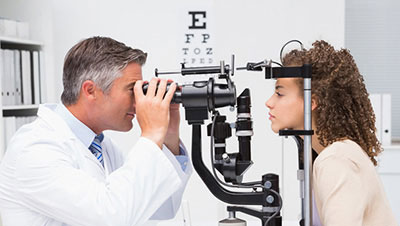Key points
- Your eyes are an important part of your health.
- Follow these guidelines for maintaining healthy eyes to protect your vision.

Vision health tips
Have a comprehensive eye exam.
You may not have any symptoms or eye problems. But visiting your eye care professional for a comprehensive dilated eye exam is the only way to be sure. Some people also don't realize they could see better with glasses or contact lenses.
A dilated eye exam is the only way to detect some common eye diseases in their early stages. These includes conditions like glaucoma, diabetic eye disease, and age-related macular degeneration. During a comprehensive dilated eye exam, your eye care professional places drops in your eyes to dilate them. This allows more light to enter the eye so your doctor can examine for any signs of damage or disease.
Wear protective eyewear.
Protective eyewear prevents eye injuries in the workplace (if needed), while playing sports or doing other activities that could cause damage. They include:
- Safety glasses and goggles.
- Safety shields.
- Eye guards designed for specific activities.
Most protective eyewear lenses are made of polycarbonate, which is 10 times stronger than other plastics. Many eye care providers sell protective eyewear, as do some sporting goods stores. Employers are required to provide a safe work environment, including protective eyewear if needed.

Wear sunglasses.
Sunglasses are a great fashion accessory, but most importantly, they protect your eyes from the sun's ultraviolet (UV) rays. When purchasing sunglasses, look for ones that block out 99 to 100% of UV-A and UV-B radiation.
Give your eyes a rest.
If you spend a lot of time at the computer or focusing your eyes on one thing, you sometimes forget to blink. This can cause eye strain or fatigue. Try the 20-20-20 rule: Every 20 minutes, look away about 20 feet in front of you for 20 seconds.
Clean your hands and contact lenses properly.
To avoid the risk of infection, always wash your hands thoroughly before putting in or taking out your contact lenses. Disinfect contact lenses as instructed and replace them as directed by your eye care professional.
More tips to prevent vision loss
Eat right to protect your sight.
Eating a diet rich in fruits and vegetables helps keep your eyes healthy. You've heard that carrots are good for your eyes. Dark leafy greens like spinach, kale, or collard greens also provide vitamins and minerals your eyes need. Research also shows eye health benefits from fish high in omega-3 fatty acids, such as salmon, tuna, and halibut.
Maintain a healthy weight.
Having overweight or obesity increases the risk of developing type 2 diabetes and other chronic conditions that could damage your eyes. If you're having trouble maintaining a healthy weight, talk to your doctor.
Maintain your blood sugar levels.
90% of blindness caused by diabetes is preventable. Ask your health care team about goals to manage your A1C level (a measurement of blood sugar), blood pressure, and cholesterol. These are known as the ABCs of diabetes.
Know your family's eye health history.
Talk to your family members about their eye health history. It's important to know since some eye disease or condition are hereditary. This information will help to determine if you're at higher risk for developing eye problems.
Quit smoking or don't start.
Smoking is as bad for your eyes as it is for the rest of your body. Research has linked smoking to an increased risk of developing:
- Age-related macular degeneration.
- Cataracts.
- Optic nerve damage.
All of these eye conditions can lead to blindness.
